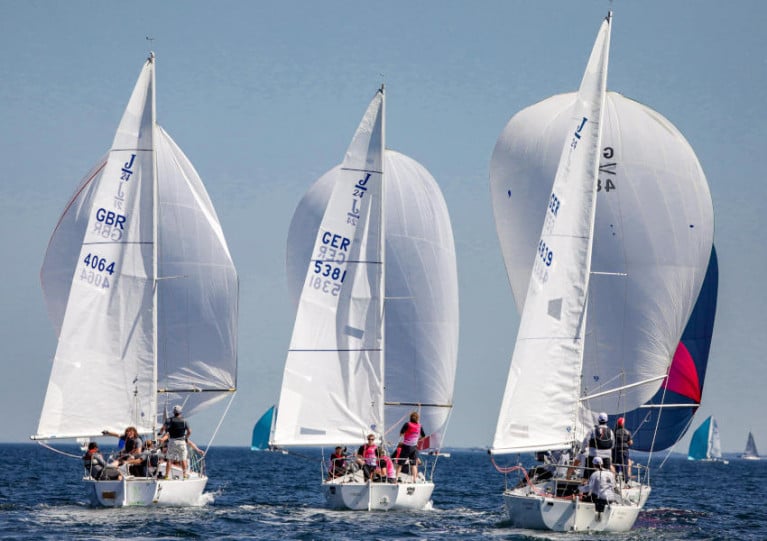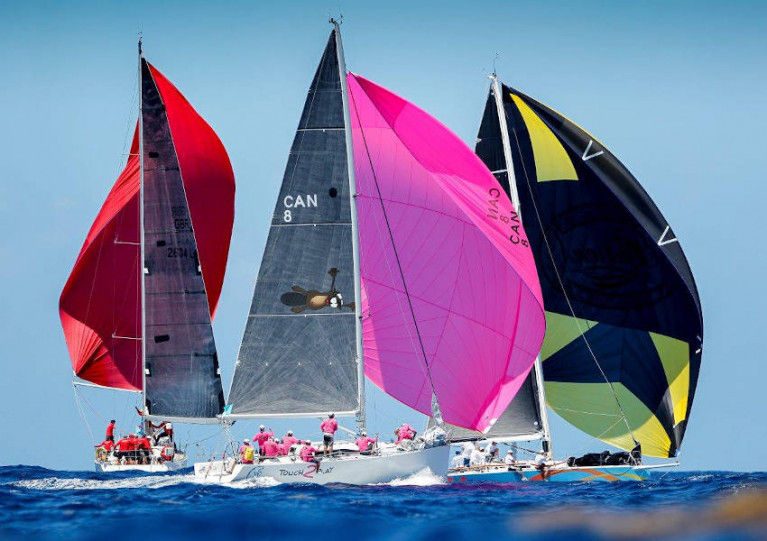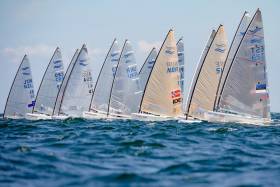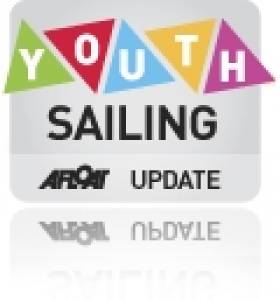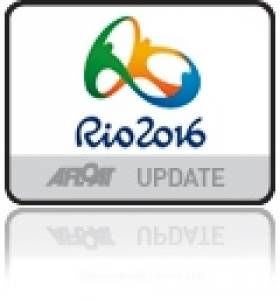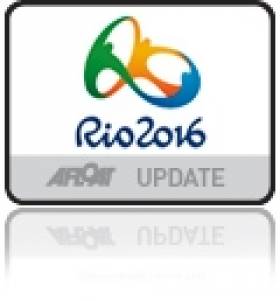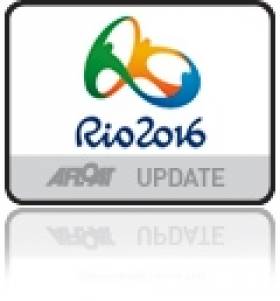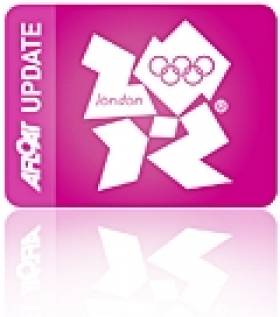Displaying items by tag: Kiel Week
As reported last month on Afloat.ie, 2020’s Kiel Week (Kieler Woche) in Germany was pushed back from its late June date to September amid the many disruptions to sailing calendars caused by the Covid-19 pandemic.
But with the change in date also comes a change in approach, as organisers of the annual regatta promise to get ‘back to basics’ with an event that puts the focus on sailing over spectators.
“The corona pandemic will keep us all busy for many months to come. We are convinced that, unfortunately, it will not yet be possible at the beginning of September to celebrate exuberantly with many people,” says Kiel’s Lord Mayor Ulf Kämpfer.
But he is emphatic that doesn’t mean the event won’t happen, only that it can go ahead in a different form from 5-13 September.
“This year it’s ‘back to the basics’ and ‘sailing plus X’. We want to put the sport of sailing — and with it the historical foundation of Kieler Woche — into the centre of attention as a signal. And we want to see what we can offer the people of Kiel beyond that.”
As for the sailing programme, Kieler Yacht-Club and the co-organising clubs have agreed to offer a platform for the boat classes that have contributed the most to the success of Kieler Woche in recent years.
“We will give an appropriate number of sailors the opportunity to sail the Kieler Woche in the usual scope,” says Dirk Ramhorst, head of organisation of the Kieler Woche regattas. “The observance of regulations and measures concerning handling and hygiene is a matter of course.”
Ramhorst continues: “The regatta cannot be held one-to-one as in June. Flexibility and new ideas are needed now.”
All planning — for example, with regard to the number of participants — is co-ordinated with the Covid-19 restrictions currently in force in Germany until August.
“This will probably also lead to maximum registration numbers in various classes,” says Ramhorst. In addition, the event area in Schilksee will be geared purely to sailing and not to visitors.
And whatever cultural events around Kiel Week deemed possible will be planned over the coming months and adapted according to the current situation, organisers say.
This year’s Antigua Sailing Week, which was originally scheduled for Sunday 26 April to Friday 1 May, has now been cancelled amid the continuing coronavirus situation.
In a statement, the major offshore regatta’s president Alison Sly-Adams said: “As a result of national and global measures being taken to contain the COVID-19 pandemic and the priority being the health and safety of our citizens, competitors, spectators and volunteers, the decision to cancel Antigua Sailing Week is the only viable option.
“We would like to thank everyone who has supported the event and worked diligently behind the scenes towards creating what was to be a remarkable edition. Now more than ever, we are committed to building on this unfortunate turn of events for a phenomenal 2021 event.
“If you are a registered participant with a boat in the region and in need of advice for onward logistics we are standing by, available to assist you.
“Please note that we will be reaching out to registered participants, sponsors and the Sailing Week team over the next week.”
Meanwhile, this summer’s Kiel Week (Kieler Woche) in Germany has been pushed back from June to September in the wake of the pandemic.
In the next few days, organiser Dirk Ramhorst says, the focus will be on informing participants and classes of preparations for the move to the new dates of 5-13 September, and the possibility of adapting the programme to new requirements.
“We still have a lot of fine-tuning to do, among others with the German Sailing Association and the World Sailing Federation. First of all we wanted to create facts for the planning,” Ramhorst says.
Recent days have seen the cancellation of the RORC’s Easter Challenge and the Scottish Series over restrictions imposed in the UK to hold back the surge of the virus.
#KielWeek - Irish high performance and pathway sailors had a strong showing at Kiel Week in Germany, with Finn Lynch just missing out on the Laser medal race at 13th overall, while Liam Glynn (38th) made the Gold fleet.
In the hotly contested Finn class, Oisin McClelland (33rd) pipped Fionn Lyden (35th) by two places in the final standings, staking his claim on the lone Tokyo 2020 berth that’s set to be decided in Aarhus this August.
Perhaps the highlight of the week for Ireland was in the 49er class, where Mark Hassett and Oisin O’Driscoll (40th) scored a third-place finish in one of their 10 races ahead of numerous gold medallists, European and world championship combos. Ryan Seaton and Seafra Guilfoyle led the Irish placers in 22nd overall, while Robert Dickson and Sean Waddilove were 32nd.
In the Laser Radial, meanwhile, Aisling Keller (21st) and Aoife Hopkins (23rd) will be boosted by their performance as the weeks tick down towards the all-important Sailing World Championships, where a quarter all all Olympics spots in Tokyo are up for grabs.
In other results, Jack Fahy finished 13th in the Laser Radial Open, ahead of Peter Fagan (16th), Tom Higgins (37th), Neil Staunton (41st) and Clare Gorman (52nd). Fagan also placed 35th in the men’s Laser Radial behind Hugo Kennedy in 20th.
Irish Youth Sailing Team Post Top Results at Kiel Week
#youthsailing – After three days sailing an Irish youth sailing team is sailing above expectation at Kiel Week event in Germany. The Irish juniors are psoting top results in 29er and 420 dinghies.
Although only competing for a short time in the 29er skiff dinghy, former Oppy sailors Johnny and Harry Durcan from Royal Cork Yacht Club (RCYC) have made Gold fleet after a run of top 10 results and going into the last day of sailing are lying 14th overall in a fleet of 84 boats.
In the 420 dinghy, Ireland is currently holding first and second places with Peter McCann and Harry Whitaker from RCYC are the lead followed by Douglas Elmes/O'Sullivan of Howth Yacht Club are in second place.
Kinsale's O'Shuilleabhain/Doran and Malahide's McDowell/McDowell are not far behind and all Irish 420 entries have achieved top 10 results in the fleet of 154 420s.
Results here
Seventh Heaven for Irish 49er FX Crew at Kiel Week
#kielewoche – Andrea Brewster and Saskia Tidey have finshed seventh overall at Kiel Week regatta in Germany their best result so far during their short 2016 Olympic sailing campaign in the womens 49erFX class.
As Afloat reported last night, the Royal Irish pair sailed within the top third of the fleet throughout the week to earn Brewster & Tidey a place in this morning's three medal races. This result was another first for the girls as medal races are reserved only for the top 10 boats in a regatta. They got off to a solid start in the 13 – 17 knot north-westerly finishing 4th in Medal Race 1. They followed this with a 9th and then pulled out a final 5th place to give them seventh overall in the 33–boat fleet.
Meanwhile in the 49er class Northern Ireland's Ryan Seaton & Matt McGovern also notched up a race win on Saturday in the larger 71 boat men's fleet. Replicating the performance of their female counterparts, the ISAF World Cup Silver medallists from Hyeres remained consistently in the top 10 progressing to today's medal races. A 10, 10, 9 put them out of reach of the podium and they finished the event in tenth overall, another solid achievement.
The next event on the horizon for both teams is the 49er & 49erFX Europeans Championships which takes place next month in Helsinki. This will be the final regatta, and final practice run, before the peak event of the season; the combined World Championships and Rio 2016 Olympic Qualifier in Spain this September.
Ireland's Debut 49erFX Team Make Kiel Week Medal Race
#49er – In a certain boost to their debut season Andrea Brewster and Saskia Tidey will race in tomorrow's medal race at Kiel week regatta after five blustery qualifying races – that included a race win.
Scoring a 10th today and dropping a 13th (discarded after 5 races) Brewster and Tidey now lie eighth overall in the Eurosaf Cup event, 20–points off the overall lead. (Download results below as a pdf file).
'We are pretty thrilled with our result as we have made it into the medal race tomorrow with the top 10 boats. This will be the first medal race we have ever qualified for' Brewster wrote on Facebook tonight.
The girls medal race starts at 10am on Friday and, according to organisers is to be broadcast live HERE.
A month ago, the Royal Irish pair were forced to withdraw from the Eurosaf regatta on Lake Garda when crew Tidey was injured in a high speed capsize. Thankfully, this injury appears to be completely behind them, with this week's performance in breeze a heartening result for the Dublin Bay campaign.
Admittedly the Kiel womens' 49erfx fleet is missing both the winner and runner up from the last outing of the ISAF world Cup in Hyeres in late April but the 33–boat fleet does contain the Danish pair Ida Marie Baad Nielsen and Marie Thusgaard Olsen who took bronze on the Cote D'Azur. Also in Kiel this week are top placed Italian and Dutch crews to reinforce the point that although Kiel may not be part of ISAF's world cup circuit it can still produce a hotly contested womens skiff event.
In the mens division, Ryan Seaton and Matt McGovern, will also contest tomorrow's medal race. The Northern Ireland skiff pair won an ISAF silver medal at Hyeres World Cup Event in April and have proved quick again this week in breezy conditions. (See above vid).
More than 4,500 sailors from more than 50 nations with 1800 boats are racing off Schilksee from 21 to 29 June at the 132nd Kieler Woche, and they are fighting for titles and medals in 42 Olympic, paralympic, international and offshore classes.
Medal Race: Front Runners From Five Nations
The wind eased for the time being. At the fourth day of Kieler Woche after three days of strong winds, there was only a light breeze on the outer fjord in Kiel. But that did not really make life of the race directors and sailors easier, since the crews proceeded on their courses at a snail's pace - too slow to get a complete race program done.
On Wednesday there will be the finals of the Olympic classes sailed on short legs and three courses. At 10am the 49erFX (TV course), Laser Radial (course India) and the Nacra17 (course Juliett) will start, followed by the 49ers at 11am (TV) and the Lasers (India) and the 470s Men (Juliett) at 11:30am.
Results: Kieler Woche day 4
2.4mR: (5 races)
1. Heiko Kroger, GER, 4 points
2. Barend Kol, NED, 9
3. Helena Lucas, GBR, 15
Sonar: (5)
1. Jens Kroker / Robert Prem, Siggy Mainka, GER, 4
2. Soren Werner / Christian Bauer, Lutz Rewa, GER, 8
3. Thomas Beer / Jorg Meierdiercks, Oliver Utrata, GER, 11
49er: (7)
1. Erik Heil / Thomas Ploessel, GER, 16
2. David Evans / Ed Powys, GBR, 26
3. Jacopo Plazzi / Umberto Molineris, ITA, 26
49er FX: (5)
1. Jena Mai Hansen / Katja Salskov-Iversen, DEN, 11
2. Victoria Jurczok / Anika Lorenz, GER, 15
3. Tamara Echegayen / Berta Betanzos, ESP, 15
Nacra 17: (6)
1. Allan Norregaard / Line Just, DEN, 15
2. Vittorio Bissaro / Silvia Sicouri, ITA, 18
3. Lorenzo Bressani / Micol Giovanna, ITA, 23
Finn: (5)
1. Bjorn Allansson, SWE, 16
2. Giorgio Poggi, ITA, 16
3. Tomas Vika, CZE, 17.3
470 M: (6)
1. Panagiotis Mantis / Pavlos Kagialis, GRE, 13
2. Mathew Belcher / Will Ryan, AUS, 17
3. Ferdinand Gerz / Oliver Szymanski, GER, 18
470 W: (6)
1. Lara Vadian / Jolanta Opar, AUT, 10
2. Annina Wagner / Elisabeth Panuschka, GER, 12
3. Alisa Kirilyuk / Liudmila Dmitrieva, RUS, 18
Laser Standard: (9)
1. Philipp Buhl, GER, 29
2. Karl-Martin Rammo, EST, 33
3. Tobias Schadewaldt, GER, 40
Laser Radial: (4)
1. Lisa Fasselt, GER, 10
2. Tatiana Drozdovskaya, BLR, 10
3. Pauline Liebig, GER, 21
Melges 24: (7)
1. Riccardo Simoneschi / Enrico Fonda, Stefano Orlandi, Federico Buscaglia, Lucia Giorgetti, ITA, 8
2. Kim Christensen / Peter Jakobsen, Mads Holmer, Jamie Lea, DEN, 11
3. John Den Engelsman / Rikst Dijkstra, Willem Jan Van Dort, Rinse Ubbink, Irena Doets, NED, 27
Platu 25: (7)
1. Gordon Nickel / Morten Nickel, Nils-Mathes Fiege, Nils Merten Farber, Sebastian Roske, GER, 9
2. Ingo Lochmann / Christian Maedel, Matthias Kruger, Jens Steinborn, Timo Chorrosch, GER, 21
3. Eiko Powilleit / Robert Heymann, Frank Barownick, Thomas Schuler, Andreas Gluschke, GER, 22
J/70: (7)
1. Claas Lehmann / Marc-Daniel Mohlmann, Bjorn Athmer, Valentin Zeller, GER, 14
2. Wouter Kollmann / Kim Platteeuw, Gilbert Figaroa, Wick Hillege, NED, 20
3. Michael Ilgenstein / Finn Mrugalla, Jan-Ole Burzinski, Terje Klockemann, GER, 21
J/80: (7)
1. Martin Menzner / Frank Lichte, Mika Rolfs, Carsten Hopp, GER, 6
2. Soren Hadeler / Peer Schickedanz, Henning Buchmann, Simon Bodermann, GER, 17
3. Hauke Kruss / Ole Sartori, Rune Schytt-Nielsen, Peer Kolberg, GER, 20
SB20: (7)
1. Alexey Murashkin / Kirill Frolov, Egor Ignatenko, RUS, 9
2. Marco Van Driel / Joost Assmann, Martijn Worseling, NED, 13
3. Leonid Altukhov / Igor Matviienko, Ruslana Taran, RUS, 19
Albin Express: (7)
1. Arne K Larssen / Merle Risy, Steffen Muhlenkamp, Sebastian Hantke, Nils Albrecht, SWE, 7
2. Andreas Pinnow / Jan Heinecke, Frieder Neu, Malte Nathke, Julian Heller, GER, 11
3. Mark Schuerch / Dirk Hornschuh, Soren Hesse, Raoul Kubler, GER, 28
Offshore:
ORC I IDM (6):
1. Platoon, Harm Muller-Speer, GER, 7.5
2. Desna, Sven Wackerhagen, GER, 21.5
3. Oxygen, Morton Ulrikkeholm, NOR, 22
ORC II IDM (6):
1. Rockall IV, Christopher Opielok, HKG, 11
2. X-Day, Niels Gauter, GER, 20
3. Sirena, Peter Buhl, DEN, 23
ORC III/IV IDM (6):
1. Sportsfreund, Axel Seehafer, GER, 10
2. Solconia, Max Gurgel, GER, 11
3. Patent3, Jens Tschentscher, GER, 13
Mixed Irish Results Coming from Kiel Week
#KiWoOnline – Last week's Weymouth Sail for Gold Gold winners Ryan Seaton and Matt McGovern are lying 21st overall at Kiel Week in Germany this morning in a fleet of 51.
The Northern Irish 49er pairing have finished the qualifying rounds of the 16–race event that continues this week. There are shots of the Ballyholme duo in the above vid.
Team mates Tiffany Brien and Saskia Tidey in the new women's Skiff are 12th from 15 starters in the 49erfx after eight races sailed so far.
Belfast's James Espey lies 91st from 97 in the Laser class.
Results here
Irish Sailors Compete at Kiel
Max Treacy and Anthony Shanks are the top Irish performers at Kiel Week in Germany, sitting in eighth place after two races. The fleet is largely diminished from the 132-boat monster entry at the Europeans, with just 22 Stars showing for Kieler Woche.
Two Irish boats are fighting it out in the Star class, with Ryan Seaton and Matt McGovern sitting in a very respectable 16th from 59 after seven races. Ed Butler and Ben Lynch are further down the rankings in 44th.
Ireland's Laser sailors are struggling in the biggest Olympic fleet, with Matty O'Dowd 93rd of 119 boats, Ronan Cull 82nd, and James Espey in 58th.


























